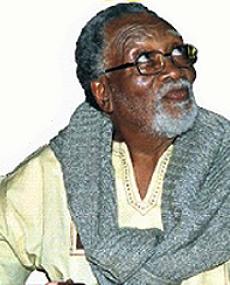
Molefe Pheto grew up in Alexandra, Johannesburg. As a talented young boy who displayed many interests in the arts, he was sent to London to study music and eventually became a music teacher. In 1970, as a young man he was active member of the Black Consciousness Movement of Azania (BMCA) for which he was detained in 1975.
He was the director of a Black Theatre group in soweto and he is widely known for his poetry and prose. He was the founding member and spokesperson of the Music, Drama, Arts and Literature Institute (MDALI) that was based in Soweto, and his arrest was also fueled by the three festivals of the black arts that were organised for this institute. He was on the forefront of the cause for black people to determine their causes as artists and musicians as he also spoke out against the exploitation of black artists by white owned galleries.
In 1977 he became exiled to Britain after spending some time in prison as a political prisoner as a member of the BMCA and of the African National Congress (ANC). During his captivity Pheto wrote many poems that were later compiled into a book And Night Fell: Memoirs of a Political Prisoner in South Africa (1983) which was published in London.
In London, Pheto and a number of exiled South Africans and political activists, staged a Non-stop Picket against apartheid at the South African embassy. The 16th of April 1988 marked the second anniversary of the protests and Pheto was among the three main speakers that addressed the crowd as a representative of the BCM, whilst David Kitson spoke for the South African Communist Party (SACP), and Rodwell Mzotane for the Pan-Africanist Congress (PAC).
When Mandela was released in 1990, Pheto was one of the people who expressed disapproval of the negotiated settlement that was reached and as a result found it difficult to return to South Africa. He wrote a book entitled the Bull from Moruleng:Vistas of Home and Exile (2012) in which he unpacks the struggle he faced upon his eventual return to South Africa and details the purchase of a farm which he would name "Ba Ngadile" which loosely translates to "they are sulking" or as others would say “they have thrown in the towel” in Setswana. This farm name was a comment on how him and his forefathers before him have "thrown in the towel" or “sulked” for many reasons from his great grandfather ending up in Mochudi, Botswana, and his father not returning to the land of Moruleng and ending up in Alexandra, to his own walking out of a Catholic sunday church service in 1957 and denouncing his christian name ‘Phineas’. Towards the end of the book he writes how the book was written as a response to "the whites that cling to yesteryear".
Many of Phetos causes were in favour of black self-assertion against a white domination of the state, as this affected all aspects of culture, from arts, literature, education and religion. He is currently a member in the Azanian People’s Organisation (AZAPO).